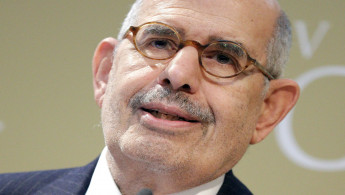Egypt’s ElBaradei breaks silence in first TV interview
Egypt's exiled former vice president Mohamed ElBaradei broke his silence to appear in his first televised interview since resigning from his post over three years ago.
The leading Egyptian opposition figure and former head of the International Atomic Energy Agency (IAEA), sat down for a lengthy interview with Al-Araby TV, the first episode of which was broadcast on Saturday.
“It’s become the duty of every person to speak… and to attempt to help even if only by one percent, because the Arab World is in crisis and has reached a stage in which it is destroying itself,” ElBaradei said explaining his decision to speak to the press.
The first of the lengthy five-episode interview focused on ElBaradei’s personal life and his experiences of Egypt’s political events, including the reign of Gamal Abdel Nasser, Anwar Sadat and the Camp David peace agreement between Egypt and Israel.
Speaking about Nasser’s mismanagement of civil affairs and his reliance on military officer to run the state, ElBaradei said, "A graduate of the armed forces can be a great commander but he won't know how to run the ministry of education."
This statement was used by Al-Araby TV to promote the interview last week, causing an online storm by supporters of Egyptian President Abdel Fattah al-Sis, who believed the statement was directed against him and his regime.
Pro-government social media users launched an Arabic-language hashtag, calling for the opposition figure's nationality to be rescinded.
"We have to take the nationality away from any traitor or agent. We have the right to do that to any dog who tries to break up his homeland," said one Twitter user.
ElBaradei resigned from his position as vice president in 2013, on the same day as the Rabaa massacre in protest of the brutal killing of an estimated 1,000 peaceful protesters demonstrating against the Sisi’s military coup.





 Follow the Middle East's top stories in English at The New Arab on Google News
Follow the Middle East's top stories in English at The New Arab on Google News


